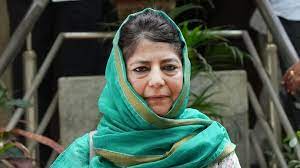Mehbooba Mufti questions Article 370, challenges India’s essence in court. Petitions expose BJP’s alleged misuse of power. Case delves into democratic and constitutional underpinnings. Justices review intricate matter, implications extend beyond legality
Table of Contents
Mehbooba Mufti’s Assertion on Article 370: “Idea of India” Under Scrutiny
Former Chief Minister of Jammu and Kashmir (J&K) and President of the People’s Democratic Party (PDP), Mehbooba Mufti, made a significant statement on Wednesday, highlighting that the fundamental “idea of India” was being tested. Her remarks were in reference to the ongoing Supreme Court proceedings that pertain to the challenges against the revocation of Article 370. This article, which granted special autonomy to J&K, was abrogated in 2019. Mufti expressed her satisfaction that the Supreme Court was set to address the petitions contesting this abrogation, viewing it not merely as a legal matter but also an emotional issue for the people of J&K. She praised the efforts of lawyers in providing a voice to the voiceless population of the region.

Exposing BJP’s Approach: Unveiling the Constitutional Trial
Mehbooba Mufti further highlighted the unfolding arguments in the Supreme Court, suggesting that they have exposed the ruling Bharatiya Janata Party (BJP). She contended that the party had exploited its parliamentary majority to manipulate the Indian Constitution. Mufti lamented the withdrawal of the special status granted to J&K, emphasizing that the implications of this action extended beyond legal dimensions. According to her, the very “idea of India” was on trial in these proceedings. She asserted that the core tenets of the country’s Constitution, its judicial system, and its democratic foundations were all under scrutiny.
The Complex Challenge: Article 370 and J&K Reorganisation Act
The legal battle at the heart of the matter revolves around the abrogation of Article 370 and the subsequent enactment of the Jammu and Kashmir Reorganisation Act in 2019. This legislation led to the bifurcation of the erstwhile state into two Union Territories: Jammu and Kashmir, and Ladakh. The contentious nature of these developments prompted numerous petitions challenging their validity, which were subsequently referred to a Constitution Bench in 2019.
As the case is being heard, a bench comprising Chief Justice of India DY Chandrachud, and Justices Sanjay Kishan Kaul, Sanjiv Khanna, BR Gavai, and Surya Kant is deliberating on the intricate legal and constitutional facets surrounding the abrogation and its aftermath.
Mehbooba Mufti’s statement on Article 370’s abrogation challenges the “idea of India” in the Supreme Court. She applauds lawyers for giving voice to J&K’s concerns and exposes BJP’s alleged constitutional misuse. The case, involving Article 370 and J&K’s reorganization, questions India’s democratic and judicial systems. A bench of justices is deliberating the complex matter, with broader implications for constitutional integrity and democratic values.
In conclusion, Mehbooba Mufti’s assertion that the “idea of India” is being tested during the Article 370 hearing in the Supreme Court reflects the profound implications of the legal proceedings. Beyond the technicalities of constitutional amendments, the case underscores the broader concepts of democratic values, constitutional integrity, and the role of the judiciary in safeguarding these principles. As the legal proceedings unfold, they provide a platform for the nation to introspect and reaffirm its commitment to the foundational ideals that shape the Indian polity.












